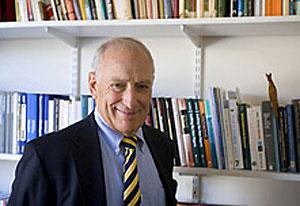Terrorism & drugsThe little-understood connection between Islamic terror and drug profits
Terrorists are in it as much for the loot as for the ideology. The Islamic State, or ISIS, could hardly exist, whatever its Islamist fervor, without hard cash from sales of pilfered petroleum, taxes on its subject population and kidnappings for ransom. Likewise ISIS- and al-Qaeda-linked groups in Africa prosper by trafficking drugs across the Sahara and by offering “protection” to smugglers who have long been trading illicit goods throughout the continent. Although Westerners tend to think of these groups as driven by ideology, new recruits may be more attracted by opportunities to make money. Combating terror in Africa, at least, now depends as much on cutting off insurgents from their sources of income as it does on defeating them on the battlefield – a much longer, tougher, and more costly pursuit.

Robert Rotberg of Harvard University // Source: harvard.edu
Terrorists are in it as much for the loot as for the ideology.
The Islamic State, or ISIS, could hardly exist, whatever its Islamist fervor, without hard cash from sales of pilfered petroleum, taxes on its subject population and kidnappings for ransom.
Likewise ISIS- and al-Qaeda-linked groups in Africa prosper by trafficking drugs across the Sahara and by offering “protection” to smugglers who have long been trading illicit goods throughout the continent. Although Westerners tend to think of these groups as driven by ideology, new recruits may be more attracted by opportunities to make money.
Terror is big business, especially in the weak and fragile parts of the world.
A growing market
The market for narcotic substances is growing substantially within Africa itself.
Until recently, the majority of powerful drugs in Africa passed through only on their way to Europe and North America.
West Africa, for example, provides a convenient shortcut and stopover point for cocaine destined for markets in Europe. East Africa sends Asian heroin to both to Europe and North America. Hashish may be locally grown in Africa, but large quantities end up in Europe along with khat, a favorite of the Somali community.
Too few social scientists have studied narcotics trafficking, particularly how drug profiteering influences and fuels terror and radical insurgent movements. My work on failed states, governance and civil conflict leads naturally to a consideration of such associations and relationships.
In my view, understanding how plunder makes terror possible is fundamental to understanding how some nonstate actors are more mercenaries than servants of a cause.
Defeating ISIS, al-Qaeda and their offshoots will, in other words, depend more on cutting off their riches than countering their appeal to wide-eyed would-be fundamentalists.
Drugs and militancy
Various big-power intelligence services are looking into how the drug trade works in Africa, and the interconnections of drug routes and militancy. The most comprehensive work is being done by the U.S. Drug Enforcement Agency (DEA), which has agents in Africa and issues pointed reports about the trade.
Nevertheless, given the clandestine nature of narcotics and trafficking, conjecture and speculation abound. With big money at stake, operatives have every reason to cover their tracks.
Thanks to research done by the Strategic Studies Institute at the Army War College, we do know that cocaine arrives in Africa from South America on an almost daily basis.
